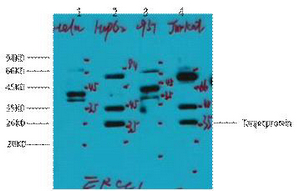CDK4 (Phospho Thr172) rabbit pAb
- Catalog No.:YP1663
- Applications:WB
- Reactivity:Human;Mouse;Rat
- Target:
- CDK4
- Fields:
- >>Endocrine resistance;>>Cell cycle;>>p53 signaling pathway;>>PI3K-Akt signaling pathway;>>Cellular senescence;>>Tight junction;>>T cell receptor signaling pathway;>>AGE-RAGE signaling pathway in diabetic complications;>>Cushing syndrome;>>Hepatitis C;>>Measles;>>Human cytomegalovirus infection;>>Influenza A;>>Human papillomavirus infection;>>Human T-cell leukemia virus 1 infection;>>Kaposi sarcoma-associated herpesvirus infection;>>Epstein-Barr virus infection;>>Pathways in cancer;>>Viral carcinogenesis;>>Pancreatic cancer;>>Glioma;>>Melanoma;>>Bladder cancer;>>Chronic myeloid leukemia;>>Small cell lung cancer;>>Non-small cell lung cancer;>>Breast cancer;>>Hepatocellular carcinoma
- Gene Name:
- CDK4
- Protein Name:
- CDK4 (Phospho-Thr172)
- Human Gene Id:
- 1019
- Human Swiss Prot No:
- P11802
- Mouse Gene Id:
- 12567
- Mouse Swiss Prot No:
- P30285
- Rat Gene Id:
- 94201
- Rat Swiss Prot No:
- P35426
- Immunogen:
- Synthesized peptide derived from human CDK4 (Phospho-Thr172)
- Specificity:
- This antibody detects endogenous levels of CDK4 (Phospho-Thr172) at Human, Mouse,Rat
- Formulation:
- Liquid in PBS containing 50% glycerol, 0.5% BSA and 0.02% sodium azide.
- Source:
- Polyclonal, Rabbit,IgG
- Dilution:
- WB 1:500-2000
- Purification:
- The antibody was affinity-purified from rabbit serum by affinity-chromatography using specific immunogen.
- Concentration:
- 1 mg/ml
- Storage Stability:
- -15°C to -25°C/1 year(Do not lower than -25°C)
- Other Name:
- Cyclin-dependent kinase 4 (EC 2.7.11.22) (Cell division protein kinase 4) (PSK-J3)
- Molecular Weight(Da):
- 33kD
- Background:
- cyclin dependent kinase 4(CDK4) Homo sapiens The protein encoded by this gene is a member of the Ser/Thr protein kinase family. This protein is highly similar to the gene products of S. cerevisiae cdc28 and S. pombe cdc2. It is a catalytic subunit of the protein kinase complex that is important for cell cycle G1 phase progression. The activity of this kinase is restricted to the G1-S phase, which is controlled by the regulatory subunits D-type cyclins and CDK inhibitor p16(INK4a). This kinase was shown to be responsible for the phosphorylation of retinoblastoma gene product (Rb). Mutations in this gene as well as in its related proteins including D-type cyclins, p16(INK4a) and Rb were all found to be associated with tumorigenesis of a variety of cancers. Multiple polyadenylation sites of this gene have been reported. [provided by RefSeq, Jul 2008],
- Function:
- catalytic activity:ATP + a protein = ADP + a phosphoprotein.,disease:CDK4 mutations are involved in tumor formation.,disease:Defects in CDK4 are the cause of cutaneous malignant melanoma 3 (CMM3) [MIM:609048, 155600]. Malignant melanoma is a malignant neoplasm of melanocytes, arising de novo or from a preexisting benign nevus, which occurs most often in the skin but also may involve other sites.,enzyme regulation:Phosphorylation at Thr-172 is necessary for enzymatic activity.,function:Probably involved in the control of the cell cycle.,similarity:Belongs to the protein kinase superfamily. CMGC Ser/Thr protein kinase family. CDC2/CDKX subfamily.,similarity:Contains 1 protein kinase domain.,subunit:Forms a stable complex with D-type G1 cyclins. Interacts with SEI1 and ZNF655/VIK.,
- Subcellular Location:
- Cytoplasm . Nucleus . Nucleus membrane . Cytoplasmic when non-complexed. Forms a cyclin D-CDK4 complex in the cytoplasm as cells progress through G(1) phase. The complex accumulates on the nuclear membrane and enters the nucleus on transition from G(1) to S phase. Also present in nucleoli and heterochromatin lumps. Colocalizes with RB1 after release into the nucleus. .
- Expression:
- Brain,Muscle,
- June 19-2018
- WESTERN IMMUNOBLOTTING PROTOCOL
- June 19-2018
- IMMUNOHISTOCHEMISTRY-PARAFFIN PROTOCOL
- June 19-2018
- IMMUNOFLUORESCENCE PROTOCOL
- September 08-2020
- FLOW-CYTOMEYRT-PROTOCOL
- May 20-2022
- Cell-Based ELISA│解您多样本WB检测之困扰
- July 13-2018
- CELL-BASED-ELISA-PROTOCOL-FOR-ACETYL-PROTEIN
- July 13-2018
- CELL-BASED-ELISA-PROTOCOL-FOR-PHOSPHO-PROTEIN
- July 13-2018
- Antibody-FAQs



